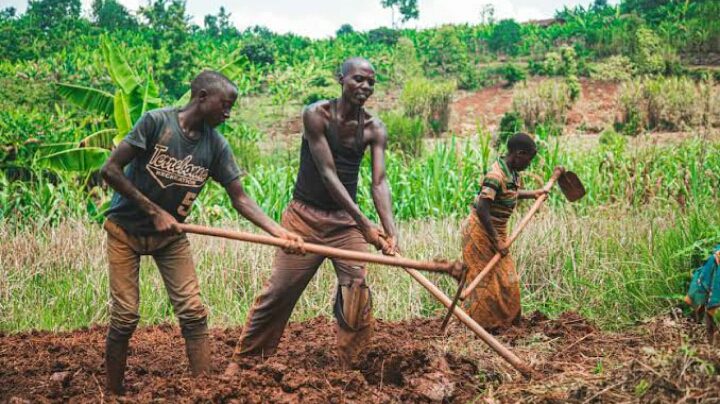Global Courant 2023-05-12 12:52:19
BY SAMUEL NABWIISO
For the East African Community to be food-secure, it is necessary to move away from agricultural practices that do not favor small farmers, who receive strong support from the seven Member States.
Small scale farmers under their Umbrella of Eastern and Southern Africa Small Scale Farmers Forum say most member states of the East African Community are investing more in conventional farming practices and are neglecting indigenous systems that are easily adopted by small scale farmers.
Conventional Farming Includes the uses of agrochemicals and pesticides in the agricultural production system that smallholder farmers say is not friendly to them.
The food producers in the region are now calling for the seven Member States to invest more resources in the development and adaptation of agroecological farming systems, which are less expensive compared to conventional farming systems, which are very expensive for small farmers in the region.
To promote agroecology. the seven Member States must invest the bulk of their agricultural budgets in developing a system that is environmentally friendly.
The farmers insist that while most African countries have signed the Malabo Declaration calling on African states to allocate 10 percent of their budget to the agricultural sector, the majority of countries, including those in the EAC Economic block , have not respected the protocol and where funds have been allocated to the sector, most of it goes to support the practices of conventional farming practices, which are more expensive for small-scale farmers.
The farmers made the call in Arusha, Tanzania at the 6th EAC Agriculture Farmers Forum organized by Eastern and Southern Africa Small-scale Farmers’ Forum (ESAFF) East African Civil Societies and other industry stakeholders such as the media and policy makers from the region.
The focus of the summit was “Agriculture and Climate Change”. Central to the discussion was the financing of the agricultural sector in the region.
At the meeting, farmers said that agroecological farming practices are a comprehensive and integrated strategy that considers both ecological and social principles and concepts in designing and managing sustainable food and farming systems.
They added that agroecological farming methods are environmentally friendly because they reduce greenhouse gas emissions, recycle resources and prioritize local supply chains.
In addition to addressing the need for socially just food systems where individuals can choose what they eat and how and where it is produced, it aims to maximize interactions between plants, animals, humans and the environment.
Hakim Baliraine, the ESAFF President East Africa, noted that agroecological farming relies solely on natural processes for inputs and recycles nutrients on site to eliminate the use of non-renewable resources, resulting in the development of a more sustainable and subsistence farming system, but he noted that most EAC countries fail to see the economic potential of the system, instead focusing more on promoting convective farming systems that typically destroy the ecosystem, degrade soil quality and wipe out biodiversity.
He explained that in order for such opportunities to be exploited by the farmers, especially the small farmers in the region, more financial resources should be invested in the system so that the farmers can benefit from it.
Baliraine further emphasized that agroecology has the power to transform food systems and make them more resilient, sustainable and inclusive.
He noted the need for a radical transformation of food and agricultural systems to address converging social, economic, health and environmental crises.
At the same meeting, Joe Mzinga, ESAFF’s regional coordinator, also noted that agroecology can transform the region’s food systems to make it more sustainable and resilient, and thus more food sovereign.
A farmer from Tanzania said the agricultural investment is needed to switch from conventional synthetic chemical-based farming practices to agroecology.
She added that the agricultural sector has the potential to uplift smallholder farmers, but the current system of agricultural production used in the region is too expensive for those who are mainly subsistence.
Why are farmers more engaged in the agricultural sector?
The sector employs the largest population in the Community and the small farmers are the largest beneficiaries in the sector, so the agricultural sector contributes significantly to the national economies of the countries in the region.
For example, in Uganda and other EAC member states, their citizens live in rural areas, more than 78% of Ugandans live in so-called “rural areas”, so their main source of income is the agricultural sector, making the sector vital in the economy of the region.
In the region, the manufacturing industry is supported by agro-processing, which accounts for about 60% of total production. However, the sector is not growing at the required pace due to the adverse effects of climate change and other factors.
Currently, the food systems in the EAC are facing a number of interrelated issues, hence the need to put in place other systems that can cope with some of the factors affecting the industry in the region.
Farmers say the EAG region is in an excellent position to build strong food production systems that are more resilient and sustainable to feed the growing population in the seven member states.
An estimated 283.7 million people live in the EAC. More than 85% of women working in the EAC’s agricultural sector, which is primarily subsistence farming, make up more than 76% of the region’s total workforce.
As agricultural development is seen as an important pillar in achieving about 9 Sustainable Development Goals (SDGs), including ending poverty and zero hunger, among other goals.
However, to achieve such goals, the EAC governments must ensure that the Malabo Declaration, which calls on all African states to invest at least 10 percent of their budget in the agricultural sector, is fully implemented, at which point funds will be available to support the agricultural sector. sector
The Malabo Declaration on Accelerating Agricultural Growth and Transformation for Shared Prosperity and Better Livelihoods, adopted in 2014 at a meeting of Heads of State in Malabo, Equatorial Guinea, aims to transform the African agricultural sector and promote the Comprehensive African Agricultural Development Program (CAADP ) the opportunity to direct agricultural development on the continent.
Recently, the EAC region received an average overall performance score of 5.60 in the third CAADP Biennial Review (BR) compared to an overall benchmark score of 7.28, which is the required score for a region to be on track in executing of the commitments made in the Malabo Declaration.
This shortfall shows that the region was not on track to meet Malabo’s 2025 targets by 2021.
The EAC region’s position as the continent’s best-functioning regional economic community is nonetheless significant. Rwanda is still on track to meet its Malabo commitments. While Kenya, Tanzania and Uganda showed some improvement in their performance between the second and third CAADP biennial assessments, the third BR found that all other partner states in the EAC region were not on track to meet their commitments.
Why the countries underperformed
It is because most of the resources for the agricultural sector are currently allocated to financing conventional agriculture, including the supply of synthetic chemicals and fertilizers, while some countries are also investing in the development and promotion of genetically modified organisms/seeds and a number of other industrial products .
This is true even though most partner states in the EAC allocate a small portion of their national budgets to the agricultural sector.
Against this background, the participants of the Arusha Summit all agreed that the Malabo Declaration should be swiftly and progressively implemented by the Heads of State of the East African Community (EAC) and their governments, and that most of their national budget for the agricultural sector should be set aside to fund agroecology, which will help end hunger and malnutrition.
Investing in Agroecology enables doubling food productivity and reducing post-harvest loss among other economic benefits such as ending poverty and providing jobs for at least 30% of the population.
In addition, the budget should be committed to increasing the ability of small-scale producers to adapt to climate variability and other shocks while preserving their ability to produce.
The budget should also promote organic fertilizers, pest and vector control, access to quality extension services, responsive research, access to appropriate technology and fair markets for small-scale farmers.
To further fund agroecology, the Heads of State of the East African Community (EAC) and their governments should develop a just and fair disbursement system of 10% agricultural budget to support small-scale farmers, especially youth and grassroots women.







